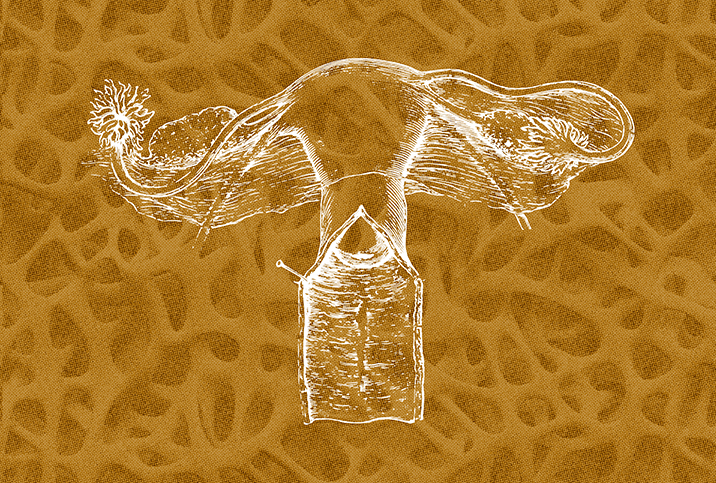How Graft-Versus-Host Disease Can Affect the Vulva and Vagina

After a bone marrow transplant, you have an increased chance of a condition called graft-versus-host disease (GVHD). This happens when the donor's cells think your body's cells are foreign and start attacking them, leading to a variety of concerns. "Graft" refers to the donated cells and "host" refers to the recipient's own tissue.
GVHD is considered a common complication of bone marrow transplants and the condition is classified as either "acute" or "chronic." Researchers estimate that anywhere from 6 percent to 80 percent of patients will develop chronic GVHD.
This condition involves "an imbalance in inflammatory mediators," explained Kecia Gaither, M.D., MPH, FACOG, double board-certified in OB-GYN and Maternal-Fetal Medicine. These mediators are what produce an inflammatory response in the body's cells or blood vessels, which can lead to tissue damage.
GVHD can affect the body in many ways, with symptoms including skin discoloration or rash, nausea and vomiting, abdominal swelling, dry eyes, shortness of breath, difficulty or pain with swallowing, fatigue, muscle weakness, joint pain or tightness, and vaginal conditions.
When GVHD affects the vulva and vagina, there is often embarrassment associated with it, and many women don't talk about their symptoms with their care provider. GHVD is nothing to be ashamed of, and it's not something you can spread to a partner. The condition can make you susceptible to vaginal/vulva infections, such as HPV, yeast infections and bacterial vaginosis—so be sure to talk to your doctor as soon as you notice something is wrong.
What symptoms should you watch for?
According to Gaither, about 25 percent of women being treated for GVHD can suffer genital issues. This can result in a host of symptoms, such as:
- Dryness and burning
- Itching
- Painful urination
- Pain or bleeding during sex
- Vaginal scarring
- Shortening of the vagina
- Labial fusion—when the inner labia around the opening of the vagina seal together
- Clitoral fusion—when parts of the clitoris fuse together
The timing of these symptoms can vary according to Carrie Terrell, M.D., an OB-GYN at the University of Minnesota Medical School and M Health Fairview. Symptoms generally start within a year after a transplant.
The vulva is usually affected first, and then the vagina. Without treatment, pain can become severe, and because of the pain and possible tightening of the vagina, it can become difficult or impossible to have sex.
In order to diagnose GVHD, your provider needs to do a physical exam. In some cases, they may need to perform a biopsy, where a small sample of vaginal tissue is removed and looked at under a microscope.
What treatment options are available?
Treatment is based on the type of symptoms you're having, or how much tissue has been damaged by GVHD, Gaither said. This could consist of medicated creams or suppositories, dilators to help widen the vaginal canal or surgery.
Your provider should talk with you about your treatment options and the possible side effects. GVHD can be short-term, but it may become a chronic condition, possibly affecting sexual function.
"Often a combination of anti-inflammatory topical agents, topical hormones, or other medications may be prescribed," Terrell explained. These medications can help control the symptoms, such as itching, scarring or pain.
Having intercourse or using a vaginal dilator two or three times a week is sometimes advised by healthcare professionals in order to keep the vaginal canal from narrowing or closing. Let your provider know if you have pain with either of these. Dilators can be discreetly ordered online, or you may be able to get these from your clinic.
In more severe cases, surgery may be recommended to correct the scarring or vaginal narrowing. It can also be needed if the vagina closes up completely. Oftentimes, dilators are prescribed as a therapy afterward in order to keep the vaginal canal from closing up again.
Preparing for the possible impact of GVHD in intimate relationships
Prior to a bone marrow transplant, consider talking with your provider about how your medical condition might affect your vaginal health. Terrell recommends meeting with a gynecology care provider, which might include a medical doctor, certified nurse-midwife or nurse practitioner, at any point in your transplant course. Here, you have the opportunity to discuss genital health, intimacy concerns and any changes that you can anticipate.
Sometimes, especially when there's a medical issue, intimacy can take a backseat while you're managing that condition, Terrell explained, but it doesn't mean your desires can't be fulfilled and supported.
"For some people vaginal intercourse or toys is important and for others, this is less of a concern," Terrell said. "Our goal is to help each individual achieve personal intimacy."
When you have a medical condition that makes sex difficult, unwanted or downright painful, the most important thing you can have is a mutual relationship that's respectful. One person's needs don't dominate the other's, Terrell explained. "Sex and intimate expression can take so many amazing and creative forms. Acknowledging one's limitations while expanding one's idea of sex can be empowering."

















